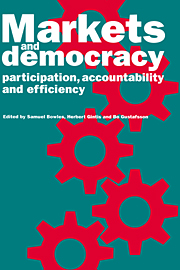Book contents
- Frontmatter
- Contents
- List of figures
- List of tables
- Preface
- 1 Post-Walrasian political economy
- Part I Agency, incentives, and democratic accountability
- Part II Institutions and institutional change
- Part III Conditions for the success of the democratic firm
- 8 After the employment relation: problems on the road to enterprise democracy
- 9 Unions versus cooperatives
- 10 Demand variability and work organization
- 11 Democracy versus appropriability: can labor-managed firms flourish in a capitalist world?
- Part IV Productivity, distribution, and power
- Part V Ownership, participation and capital markets
- Part VI Political democracy and economic democracy
- Bibliography
- Author index
- Subject index
8 - After the employment relation: problems on the road to enterprise democracy
Published online by Cambridge University Press: 05 March 2012
- Frontmatter
- Contents
- List of figures
- List of tables
- Preface
- 1 Post-Walrasian political economy
- Part I Agency, incentives, and democratic accountability
- Part II Institutions and institutional change
- Part III Conditions for the success of the democratic firm
- 8 After the employment relation: problems on the road to enterprise democracy
- 9 Unions versus cooperatives
- 10 Demand variability and work organization
- 11 Democracy versus appropriability: can labor-managed firms flourish in a capitalist world?
- Part IV Productivity, distribution, and power
- Part V Ownership, participation and capital markets
- Part VI Political democracy and economic democracy
- Bibliography
- Author index
- Subject index
Summary
Introduction
Suppose that there were a determined social consensus in favor of workplace democracy such that conventional employment relationships were ruled out by custom, by constitution, or by law. That is, assume that it has been decided that most enterprises will be so organized that the right to choose their boards of directors, managers, or other decision-making bodies and personnel, or directly to determine major enterprise policies, is assigned to their workers and only to their workers (including managerial personnel), on the basis of one worker, one vote. What problems should be anticipated, and how might these be dealt with by appropriate institutional design or policies? In this chapter, I attempt to apply the results of the theoretical and empirical literatures on worker-managed firms, along with some personal rumination, to the question of the costs and dangers of implementing enterprise democracy in a market economy.
The chapter is organized as follows. Section 2 briefly reconsiders the old question of why capital hires labor, in other words why worker-run firms are not the norm, in market economies. Section 3 is equally brief, giving a preliminary discussion of the question of society-wide institutional change viewed as a change in the regime of rights. The next three sections provide the core discussion of what past studies of self-management imply for the transition to an economy of worker-managed firms. Section 4 deals with issues of employment, membership rights, and product market behavior. Section 5 treats financing of worker-run firms and property rights in capital goods. Section 6 deals with some less standard topics, including decision-making mechanisms, work organization, and job satisfaction.
- Type
- Chapter
- Information
- Markets and DemocracyParticipation, Accountability and Efficiency, pp. 129 - 147Publisher: Cambridge University PressPrint publication year: 1993
- 2
- Cited by

